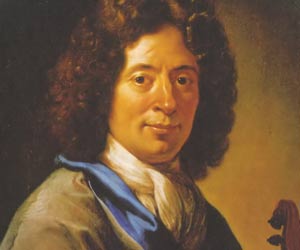February 11, 2013.Arcangelo Corelli.The Italian composer and violinist was born on February 17, 1653 in a small town of Fusignano, not far from Ravenna.He studied music in the nearby Faenza, better known for its ceramics than music, and then moved to Bologna, which indeed was an important cultural center of the time.Bologna had a famous school of violin playing, and Corelli studied with several noted violinists.It is said that around that time he probably made several trips abroad: to France, where he might have met Jean-Baptiste Lully, and to Germany. He later moved to Rome, where he found several influential patrons, Cardianl Ottoboni and Queen Christina of Sweden being the major ones.He had pupils, some of whom became quite famous as composers, for example Francesco Geminiani and Pietro Locatelli, and many violinists.Corelli’s greatest contribution was in the development of Concerti Grossi.In a concerto grosso the musical interplay happens between a small group of soloists and the full (usually string) orchestra.Corelli’s concerti grossi constitute his famous Opus 6, the first eight compositions of which are designated as “church concertos,” and the following four – as concerti da camera, or chamber concerts.They were not published till 1714, after Corellis’s death, but Georg Muffat, who stayed in Italy in the 1680s, reported to have heard Corelli’s concerti grossi in 1682.One of the best known examples of concerti grossi was written about 60 years later by Handel, also as his opus 6.Corelli’s concerti became very popular throughout Europe, and are often played these days by authentic instruments ensembles.Corelli influenced many composers, Giuseppe Torelli and Antonio Vivaldi more than other.Johann Sebastian Bach studied his work and, copyright not being an issue in the seventeen century, based some of his music on Corelli’s.
One of the most popular of Corelli’s concerti grossi is number eight, commonly known as “Christmas Concerto.”You can listen to it here, in a decidedly unauthentic but still pleasing performance by the Berlin Philharmonic, Herbert von Karajan conducting (courtesy of YouTube).
Arcangelo Corelli 2013
February 11, 2013. Arcangelo Corelli. The Italian composer and violinist was born on February 17, 1653 in a small town of Fusignano, not far from Ravenna. He studied music in the nearby Faenza, better known for its ceramics than music, and then moved to Bologna, which indeed was an important cultural center of the time. Bologna had a famous school of violin playing, and Corelli studied with several noted violinists. It is said that around that time he probably made several trips abroad: to France, where he might have met Jean-Baptiste Lully, and to Germany. He later moved to Rome, where he found several influential patrons, Cardianl Ottoboni and Queen Christina of Sweden being the major ones. He had pupils, some of whom became quite famous as composers, for example Francesco Geminiani and Pietro Locatelli, and many violinists. Corelli’s greatest contribution was in the development of Concerti Grossi. In a concerto grosso the musical interplay happens between a small group of soloists and the full (usually string) orchestra. Corelli’s concerti grossi constitute his famous Opus 6, the first eight compositions of which are designated as “church concertos,” and the following four – as concerti da camera, or chamber concerts. They were not published till 1714, after Corellis’s death, but Georg Muffat, who stayed in Italy in the 1680s, reported to have heard Corelli’s concerti grossi in 1682. One of the best known examples of concerti grossi was written about 60 years later by Handel, also as his opus 6. Corelli’s concerti became very popular throughout Europe, and are often played these days by authentic instruments ensembles. Corelli influenced many composers, Giuseppe Torelli and Antonio Vivaldi more than other. Johann Sebastian Bach studied his work and, copyright not being an issue in the seventeen century, based some of his music on Corelli’s.
and then moved to Bologna, which indeed was an important cultural center of the time. Bologna had a famous school of violin playing, and Corelli studied with several noted violinists. It is said that around that time he probably made several trips abroad: to France, where he might have met Jean-Baptiste Lully, and to Germany. He later moved to Rome, where he found several influential patrons, Cardianl Ottoboni and Queen Christina of Sweden being the major ones. He had pupils, some of whom became quite famous as composers, for example Francesco Geminiani and Pietro Locatelli, and many violinists. Corelli’s greatest contribution was in the development of Concerti Grossi. In a concerto grosso the musical interplay happens between a small group of soloists and the full (usually string) orchestra. Corelli’s concerti grossi constitute his famous Opus 6, the first eight compositions of which are designated as “church concertos,” and the following four – as concerti da camera, or chamber concerts. They were not published till 1714, after Corellis’s death, but Georg Muffat, who stayed in Italy in the 1680s, reported to have heard Corelli’s concerti grossi in 1682. One of the best known examples of concerti grossi was written about 60 years later by Handel, also as his opus 6. Corelli’s concerti became very popular throughout Europe, and are often played these days by authentic instruments ensembles. Corelli influenced many composers, Giuseppe Torelli and Antonio Vivaldi more than other. Johann Sebastian Bach studied his work and, copyright not being an issue in the seventeen century, based some of his music on Corelli’s.
One of the most popular of Corelli’s concerti grossi is number eight, commonly known as “Christmas Concerto.” You can listen to it here, in a decidedly unauthentic but still pleasing performance by the Berlin Philharmonic, Herbert von Karajan conducting (courtesy of YouTube).